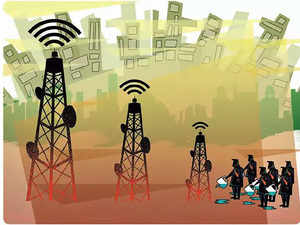Telecom firms are back to square one
The Supreme Court order disallowing telecom operators from using Aadhaar for verification will prolong the time taken to get mobile phone connections and could increase customer acquisition costs by as much as 10 times.
“With enrolment via Aadhaar, we took 30 minutes to get a customer on board and now one will have to wait for 5-6 days for our officers to go to their addresses and verify their details. It seems like we have gone back in time and now enrolment will happen slowly, like the earlier times,” said a senior executive of a private telco.

The apex court’s verdict curbing the use of the unique identity number will also add financial pressure on the industry, which is reeling under debt of more than Rs 7 lakh crore amid competition that is eroding revenue and profitability.
The cost of enrolling a new customer with Aadhaar is about Rs 30, according to another senior telecom company executive. Now, with verification going back to old ways, the telcos will have to send agents to every household, possibly making multiple trip , and this would cost Rs 250-300 per new subscriber.
The industry estimates the number of Aadhaar-linked subscribers at about 500 million, mostly in urban areas, or about half of India’s total mobile customer base.
Moreover, over 80% of new users are being enrolled using the Aadhaar e-verification process.
“The industry body had always supported the use of Aadhaar, which was secure and useful for both customer and sector in terms of costs and time. We now await the Department of Telecommunications’ instructions and will be fully compliant with it,” Mathews told ET.
The Supreme Court order disallowing telecom operators from using Aadhaar for verification will prolong the time taken to get mobile phone connections and could increase customer acquisition costs by as much as 10 times.
“With enrolment via Aadhaar, we took 30 minutes to get a customer on board and now one will have to wait for 5-6 days for our officers to go to their addresses and verify their details. It seems like we have gone back in time and now enrolment will happen slowly, like the earlier times,” said a senior executive of a private telco.

The apex court’s verdict curbing the use of the unique identity number will also add financial pressure on the industry, which is reeling under debt of more than Rs 7 lakh crore amid competition that is eroding revenue and profitability.
The cost of enrolling a new customer with Aadhaar is about Rs 30, according to another senior telecom company executive. Now, with verification going back to old ways, the telcos will have to send agents to every household, possibly making multiple trip , and this would cost Rs 250-300 per new subscriber.
The industry estimates the number of Aadhaar-linked subscribers at about 500 million, mostly in urban areas, or about half of India’s total mobile customer base.
Moreover, over 80% of new users are being enrolled using the Aadhaar e-verification process.
Those volunteering their Aadhaar number for a mobile phone connection will still have to be physically verified.
While the court said the government can amend the law to permit Aadhaar-based e-verification in telecom and other sectors, such changes can be legally challenged.
“We are still going through the SC verdict. We will decide on what to do and how to go about things once we have completely grasped the verdict,” telecom minister Manoj Sinha said.
Rajan Mathews, director general of the Cellular Operators Association of India (COAI) — which represents all major telcos — said the industry will comply with the directions of the Department of Telecommunications (DoT) in this matter.
While the court said the government can amend the law to permit Aadhaar-based e-verification in telecom and other sectors, such changes can be legally challenged.
“We are still going through the SC verdict. We will decide on what to do and how to go about things once we have completely grasped the verdict,” telecom minister Manoj Sinha said.
Rajan Mathews, director general of the Cellular Operators Association of India (COAI) — which represents all major telcos — said the industry will comply with the directions of the Department of Telecommunications (DoT) in this matter.
“The industry body had always supported the use of Aadhaar, which was secure and useful for both customer and sector in terms of costs and time. We now await the Department of Telecommunications’ instructions and will be fully compliant with it,” Mathews told ET.
According to industry executives, operators will have to table their concerns on the judgement with the DoT, following which a meeting will be convened for the government’s directions. Vodafone Idea, Bharti Airtel and Reliance Jio Infocomm did not respond to ET’s mails seeking comment on the matter.
The three private sector telcos are also the largest in the country and, along with state-run Bharat Sanchar Nigam (BSNL), compete to enrol subscribers in rural areas, which is crucial to their growth.
“The tele-density of urban regions is about 155% and in rural areas it is 58%. Now, with the delays in registration, our plans to ramp up in these areas will take a hit,” said a third senior company executive. Tele-density is a measure of telephone connections for every hundred individuals.
The court also said that authentication records obtained via Aadhaar that are already with telcos should not be stored beyond six months.
The court also said that authentication records obtained via Aadhaar that are already with telcos should not be stored beyond six months.
Operators said they need more details on what documents would be accepted from subscribers as per ‘know-your-customer’ rules for verification in place of Aadhaar data. “We have to comply with whatever the Supreme Court has said on Aadhaar validity. In my opinion, if required, there will be no problem in removing consumer data as this is apparently a software-driven function,” a senior BSNL official said.
Comments
Post a Comment